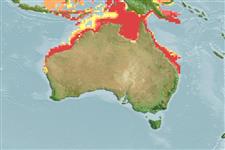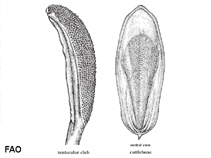Sepia smithi Hoyle, 1885
Smith's cuttlefish| Native range | All suitable habitat | Point map | Year 2050 |

|
| This map was computer-generated and has not yet been reviewed. |
| Sepia smithi AquaMaps Data sources: GBIF OBIS |
Classification / Names Common names | Synonyms | CoL | ITIS | WoRMS
Cephalopoda | Sepiida | Sepiidae
Environment: milieu / climate zone / depth range / distribution range Οικολογία
; εύρος βάθους 7 - 138 m (Ref. 1695). Tropical; 5°S - 27°S, 113°E - 154°E (Ref. 1695)
Κατανομή Χώρες | Περιοχές FAO | Οικοσυστήματα | Παρουσίες | Εισαγωγές
Indo-Pacific: Northern Australia.
Length at first maturity / Μέγεθος / Βάρος / Age
Maturity: Lm ? range ? - ? cm Max length : 14.0 cm ML αρσενικό/απροσδιόριστο; (Ref. 1695); 15 cm ML (female)
Life cycle and mating behavior Γεννητική Ωρίμανση | Αναπαραγωγή | Γεννοβολία | Αβγά | Γονιμότητα | Προνύμφες
Members of the class Cephalopoda are gonochoric. Male and female adults usually die shortly after spawning and brooding, respectively. Mating behavior: Males perform various displays to attract potential females for copulation. During copulation, male grasp the female and inserts the hectocotylus into the female's mantle cavity where fertilization usually occurs. Life cycle: Embryos hatch into planktonic stage and live for some time before they grow larger and take up a benthic existence as adults.
Main reference
Αναφορές | Συντονιστής | Συνεργάτες
Jereb, P. and C.F.E. Roper (eds.). 2005. (Ref. 1695)
IUCN Red List Status (Ref. 130435: Version 2024-1)
Least Concern (LC) ; Date assessed: 28 March 2009
CITES status (Ref. 108899)
Not Evaluated
CMS (Ref. 116361)
Not Evaluated
Threat to humans
Harmless
Human uses
| FishSource |
Εργαλεία
Περισσότερες πληροφορίες
Trophic Ecology
Τροφικά αντικείμενα
Δίαιτα
Κατανάλωση τροφής
Σιτηρέσιο
Θηρευτές
Δίαιτα
Κατανάλωση τροφής
Σιτηρέσιο
Θηρευτές
Ecology
Population dynamics
Αύξηση
Age/Size
Length-weight
Length-length
Length-frequencies
Mass conversion
Στρατολόγηση
Αφθονία
Age/Size
Length-weight
Length-length
Length-frequencies
Mass conversion
Στρατολόγηση
Αφθονία
Life cycle
Distribution
Human Related
Προφίλ υδατοκαλλιέργειας
Stamps, Coins Misc.
Stamps, Coins Misc.
Outreach
Taxonomy
References
Διαδικτυακές πηγές
BHL | BOLD Systems | CISTI | DiscoverLife | FAO(Publication : search) | Fishipedia | GenBank (genome, nucleotide) | GloBI | Gomexsi | Google Books | Google Scholar | Google | PubMed | Δέντρο Ζωής | Wikipedia (Go, αναζήτηση) | Zoological Record
Estimates based on models
Preferred temperature
(Ref. 115969): 24.5 - 28.1, mean 27.1 (based on 255 cells).



